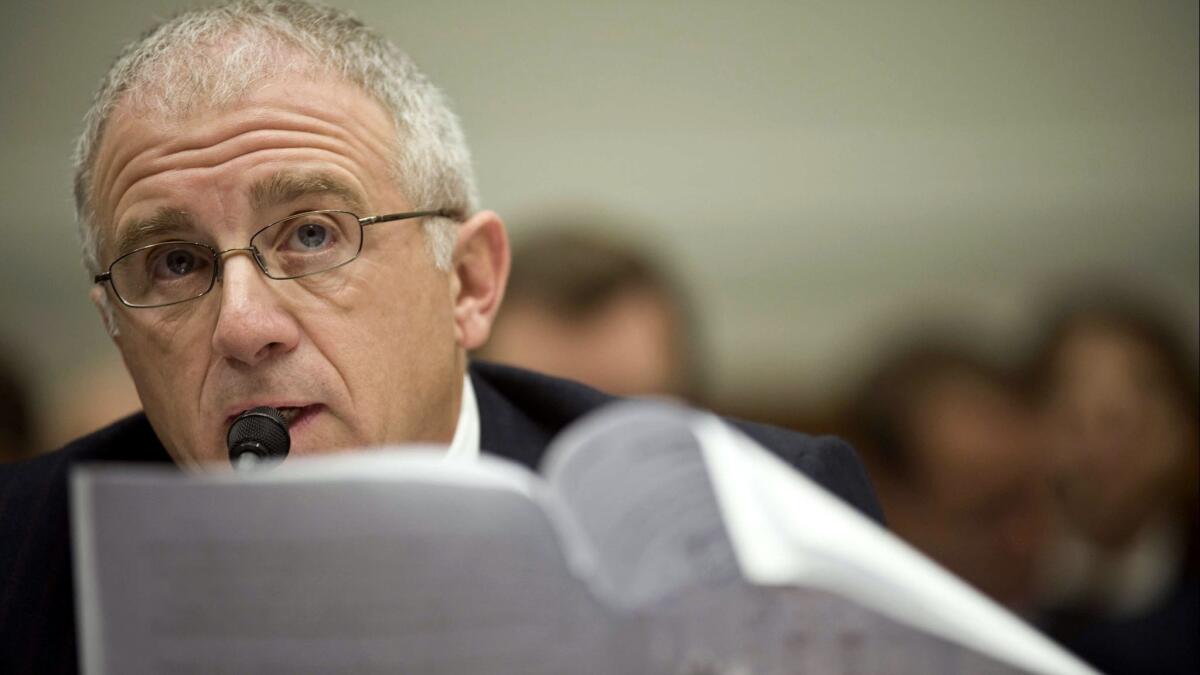Op-Ed: Everyone’s worst fears about the Live Nation-Ticketmaster merger have come true

- Share via
When President Obama was deciding in 2009 whether to approve a merger between the world’s largest concert promoter, Live Nation, and the biggest ticket provider, Ticketmaster, a group of bipartisan lawmakers pleaded with his administration to block the deal. This coalition, which included me, understood that the joint company would strangle competition in live entertainment.
Obama’s top antitrust regulator at the time, then-assistant Atty. Gen. Christine A. Varney, reassured critics that “there will be enough air and sunlight in the space for strong competitors to take root, grow, and thrive.” The merger was waved through and became final in 2010.
Eight years later, there are no strong competitors taking root, growing or thriving. The online ticketing market, now a $9-billion business, is still dominated by Live Nation-Ticketmaster. In 2008, the two companies held more than 80% of the market share. Combined, the new company, Live Nation Entertainment, has grown even larger, acquiring other ticket companies, promoters and festivals, including Lollapalooza and Bonnaroo.
Live Nation Entertainment controls “nearly every aspect” of the ticket business, producing record-high ticket prices and onerous fees, according to an investigation published last month by the New York Times. The Department of Justice is now looking into complaints that the company, which also manages hundreds of top artists, tried to coerce venues into using Ticketmaster.
There is no question that Live Nation is exploiting the system to its advantage.
I requested an evaluation of the ticket market from the Government Accountability Office last year. The GAO’s findings, made public this week, confirm that the sprawling and opaque Live Nation system is squeezing consumers.
The GAO found that the ticket market as a whole is rife with practices that are “not fully transparent,” and that Live Nation, which claims more than half of ticket sales in the United States, engages in questionable gimmicks to conceal its extra costs.
Service fees, processing fees, facility fees, promoting fees: Americans know all about these add-ons, hidden until just before they click to buy those Taylor Swift tickets. Live Nation refers to these charges as an “extension of the ticket price,” an Orwellian construct if there ever were one.
These fees make it difficult for consumers to know the true value of concert tickets. Primary ticketing companies — the box office or ticket booth at the venue itself, say — impose fees that, on average, amount to 27% of the original ticket price. Secondary ticketing companies, such as the eBay subsidiary StubHub, charge an average of 31% of the ticket price. Because Live Nation controls a significant portion of both markets, the extra fees give the company an enormous competitive edge.
Moreover, if the GAO report is correct, Ticketmaster is not abiding by earlier promises to stop some of its deceptive tactics. In 2009, when tickets went on sale for a series of Bruce Springsteen concerts, the company displayed a “No Tickets Found” message on its website, steering customers to its affiliate in the secondary market, TicketsNow, where tickets were offered at much higher prices. Although Ticketmaster settled the case with the Federal Trade Commission in 2010, the GAO found that the company continues to engage in similarly manipulative practices.
Not all of the problems identified by the GAO can be attributed solely to Live Nation, and many of them predate the merger. But there is no question that Live Nation is exploiting the system to its advantage. The company has sway over nearly every facet of the live-event business: recording, record sales, licensing, talent management, venue ownership, ticketing services and even concessions.
Its dominance is reminiscent of the old Hollywood studio system, in which men like Jack Warner and Louis B. Mayer exerted near total power: writing and producing all their movies, holding exclusive contracts with actors, colluding to control how films were distributed and owning the theaters in which they were shown. That system of vertical integration stifled independent producers until the Supreme Court forced studios to sell their theaters.
The ticket marketplace is mammoth, nontransparent and wildly speculative, and federal regulation is nonexistent. After the Springsteen tickets fiasco, I introduced the BOSS Act (Better Oversight of Secondary Sales and Accountability in Concert Ticketing) to create better transparency in the ticketing market. Following the GAO’s report, I will be reintroducing that legislation soon.
But regulation alone won’t solve the Live Nation problem. The company should be broken up.
When the merger was under consideration, Live Nation’s lobbyists, led by former executive chairman Irving Azoff, displayed a sense of entitlement and dismissiveness toward their customers — a preview of how the company would wield its monopolistic power. Without action from Congress and more stringent enforcement from the Department of Justice, there is no reason to believe Live Nation Entertainment will behave any differently now.
Representative Bill Pascrell Jr. represents New Jersey’s 9th Congressional District.
Follow the Opinion section on Twitter @latimesopinion or Facebook
More to Read
A cure for the common opinion
Get thought-provoking perspectives with our weekly newsletter.
You may occasionally receive promotional content from the Los Angeles Times.






